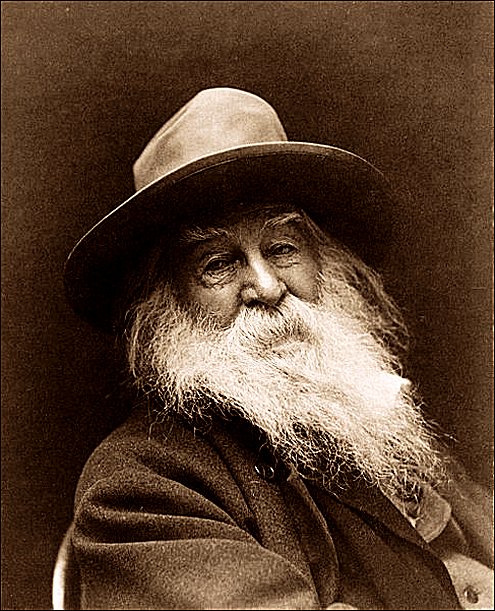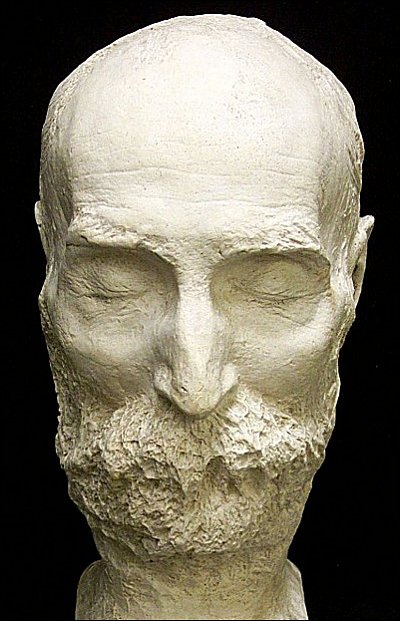Walt Whitman poem: The Poet

W a l t W h i t m a n
(1819-1892)
T h e P o e t
1
Now list to my morning’s romanza;
To the cities and farms I sing, as they spread in the sunshine before me.
2
A young man came to me bearing a message from his brother;
How should the young man know the whether and when of his brother?
Tell him to send me the signs.
And I stood before the young man face to face, and took his right hand in
my left hand, and his left hand in my right hand,
And I answered for his brother, and for men, and I answered for THE POET,
and sent these signs.
Him all wait for–him all yield up to–his word is decisive and final,
Him they accept, in him lave, in him perceive themselves, as amid light,
Him they immerse, and he immerses them.
Beautiful women, the haughtiest nations, laws, the landscape, people,
animals,
The profound earth and its attributes, and the unquiet ocean (so tell I my
morning’s romanza),
All enjoyments and properties, and money, and whatever money will buy,
The best farms–others toiling and planting, and he unavoidably reaps,
The noblest and costliest cities–others grading and building, and he
domiciles there,
Nothing for any one but what is for him–near and far are for him,–the
ships in the offing,
The perpetual shows and marches on land, are for him, if they are for
anybody.
He puts things in their attitudes;
He puts to-day out of himself, with plasticity and love;
He places his own city, times, reminiscences, parents, brothers and
sisters, associations, employment, politics, so that the rest never
shame them afterward, nor assume to command them.
He is the answerer;
What can be answered he answers–and what cannot be answered, he shows how
it cannot be answered.

3
A man is a summons and challenge;
(It is vain to skulk–Do you hear that mocking and laughter? Do you hear
the ironical echoes?)
Books, friendships, philosophers, priests, action, pleasure, pride, beat up
and down, seeking to give satisfaction;
He indicates the satisfaction, and indicates them that beat up and down
also.
Whichever the sex, whatever the season or place, he may go freshly and
gently and safely, by day or by night;
He has the pass-key of hearts–to him the response of the prying of hands
on the knobs.
His welcome is universal–the flow of beauty is not more welcome or
universal than he is;
The person he favours by day or sleeps with at night is blessed.
Every existence has its idiom–everything has an idiom and tongue;
He resolves all tongues into his own, and bestows it upon men, and any man
translates, and any man translates himself also;
One part does not counteract another part–he is the joiner–he sees how
they join.
He says indifferently and alike, "How are you, friend?" to the President
at his levee,
And he says, "Good-day, my brother!" to Cudge that hoes in the sugar-
field,
And both understand him, and know that his speech is right.
He walks with perfect ease in the Capitol,
He walks among the Congress, and one representative says to another, "Here
is our equal, appearing and new."
4
Then the mechanics take him for a mechanic,
And the soldiers suppose him to be a soldier, and the sailors that he has
followed the sea,
And the authors take him for an author, and the artists for an artist,
And the labourers perceive he could labour with them and love them;
No matter what the work is, that he is the one to follow it, or has
followed it,
No matter what the nation, that he might find his brothers and sisters
there.
The English believe he comes of their English stock,
A Jew to the Jew he seems–a Russ to the Russ–usual and near, removed from
none.
Whoever he looks at in the travellers’ coffee-house claims him;
The Italian or Frenchman is sure, and the German is sure, and the Spaniard
is sure, and the island Cuban is sure;
The engineer, the deck-hand on the great lakes, or on the Mississippi, or
St. Lawrence, or Sacramento, or Hudson, or Paumanok Sound, claims him.
The gentleman of perfect blood acknowledges his perfect blood;
The insulter, the prostitute, the angry person, the beggar, see themselves
in the ways of him–he strangely transmutes them,
They are not vile any more–they hardly know themselves, they are so grown.

Walt Whitman poem: The Poet
KEMP=MAG poetry magazine
More in: Whitman, Walt

